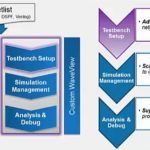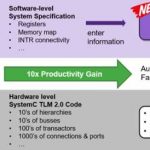Nvidia has found that video games are the perfect metaphor for autonomous driving. To understand why this is so relevant you have to realize that the way self-driving cars see the world is through a virtual world created in real time inside the processors used for autonomous driving – very much like a video game. It’s a little bit like… Read More
Tag: synopsys
Expert Interview: Rajeev Madhavan
This blog was originally posted on Paysa.com but since Rajeev Madhavan is one of our EDA Heroes I thought it was worth a re-post. In case you do not know Rajeev, he started his EDA career at Cadence then was co-founder and VP of Engineering at LogicVision (acquired by Mentor). Next he was Founder, President, and Chairman of Ambit Design… Read More
ATPG, Automotive and 7nm FinFET
The state of Texas hosted two or our industry’s big technical conferences and trade shows this year: DAC and ITC (International Test Conference). IC designers know about DAC in Austin, and test engineers know about ITC in Dallas. I travelled to Austin to cover DAC this past summer, and I was able to connect with Robert Ruiz … Read More
Ford Motors Discusses Future Mobility Trends at Synopsys Seminar
Five or ten years ago it would have been hard to imagine someone from Ford Motors giving the keynote at a technology summit at a major EDA company like Synopsys. However, on November 2[SUP]nd[/SUP], Synopsys hosted a seminar on the topic of Automotive Architecture Design and System Testing, and Ford Technical Fellow Jim Buczkowski… Read More
FPGAs allow customization of SEU mitigation
Teams working on avionics, space-based electronics, weapons delivery systems, nuclear generating plants, medical imaging equipment, and other applications where radiation leads to single-event upsets (SEU) are already sensitive to functional safety requirements. What about automotive applications?
With electronic… Read More
IP-SoC 2016: IP Innovation, Foundries, IoT and Security
The next IP-SoC conference will be held in Grenoble, France, on December 6-7, 2016 after Shanghai in September and Bangalore, India, in April. This will be the 20[SUP]th[/SUP] edition of this unique IP centric event, as well as the celebration of Design And Reuse 20[SUP]th[/SUP] anniversary. Creating in 1997 a company fully dedicated… Read More
Circuit Simulation Videos Show How To
One of the things that I miss most about attending trade shows like DAC in the old days was that you actually got to see EDA tools being demonstrated live in the exhibit area. You could see what the GUI looked like, how the dialogs worked, and learn what kind of control you could have during analysis. Most of what you see today at DAC in the… Read More
Drift is a Bad Thing for SPICE Circuit Simulators
My first job out of college was with Intel, located in Aloha, Oregon and I did circuit simulations using a proprietary SPICE circuit simulator called ASPEC that was maintained in-house. While doing some circuit simulations one day I noticed that an internal node in one of my circuits was gradually getting higher and higher, even… Read More
Synopsys Hosting Formal Methods in CAD Conference Next Week
FMCAD (Formal Methods in Computer Aided Design) is a technical conference with a 20-year pedigree. This is a conference for serious formal methods teams. Key notes are from Berkeley and UCLA, committee members are all formal heavyweights and best I can tell, there is no exhibitors area.… Read More
Getting out of DIY Mode for Virtual Prototypes
Virtual prototyping has, inexplicably, been largely a DIY thing so far. Tools and models have come from different sources with different approaches, and it has been up to the software development team to do the integration step and cobble together a toolchain and methodology that fits with their development effort.
That integration… Read More








